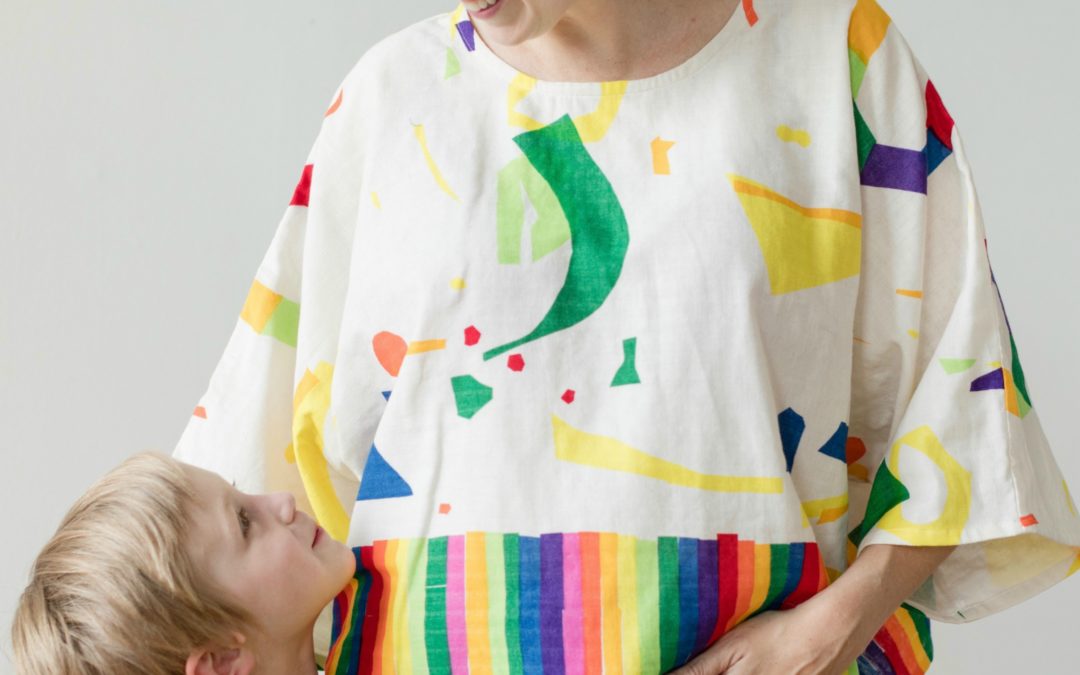Can you believe that our choices in the fashion industry can impact our planet and its people? Learning about slow fashion and making a few small adjustments in your life can bring on big change. It’s easy to make a difference.
Slow fashion is a newer concept so to better understand it, let’s dig briefly into its opposite: fast fashion. Fast fashion describes (usually trendy) fashion that is quickly designed and produced. It’s available everywhere and it’s available cheaply. We all probably have fast fashion pieces in our wardrobes…especially with kid clothes, maternity or nursing clothes. It happens. Don’t feel guilty about it.
Since it’s produced quickly and as cheaply as possible, manufacturing is usually outsourced to factories in countries like Bangladesh and China. This means low wages — sometimes as low as $43/month in Bangladesh. Tight deadlines and crazy quotas also lead to unsafe work environments.
Fast fashion garments are not made to last which means more waste. Americans throw away around 12.7 million tons, or 68 pounds of textiles per person, annually. This is approximately 1.6 million tons of which could otherwise be recycled or reused. PLUS all that fabric being produced requires resources including coal, water, and gas for transport.
Basically, fast fashion is hard on the planet and it’s hard on people.
So, that brings us to slow fashion. The phrase “slow fashion” is a newer concept even though slow fashion has been around forever. To me, the slow fashion process is thoughtful from design to production to the consumer’s purchase process. It’s “slow” because each part of the process is intentional. More time is put into each design and garment. By slowing down our own purchasing process, slow fashion forces us to think about the impact of our choices in the fashion industry and how they affect our planet and its people.
There are some really great benefits to slow fashion.
Slow fashion is made to last. Garments are designed to be timeless. Plus slow fashion is often made by hand allowing for careful construction. You’ll be able to wear slow fashion for a lifetime or pass it on to someone else if you choose.
Slow fashion tells a story. For me, a good example of this is our recent Omiyage Collection that was inspired by our trip to Japan. I brought back a handful of Japanese fabric. My memories from that trip are sewn into each garment and I share that story with all of our customers. The where/how/why’s are different for every designer, but there is always a story.
Slow fashion is also better for the environment. Surprise! Not only is there less waste, but fewer natural resources are used. And fewer chemicals.
That leads us to what we can do. Garments made by hand or by ethical companies/designers cost more. Obviously, it’s not practical to go out and buy all new garments — that would also produce a lot of waste. But, it’s not hard to make small adjustments in your life to make a difference.
- Care for your current garments. Wash everything in cold water. Air dry. Holes? Small fixes? Mend or have someone else mend.
- Give your clothes a second life. Consign with Jackie Heller at Revive Consignment. Join the Buy/Sell/Trade sites on Facebook. Selling or consigning clothes you don’t wear anymore can fund your next purchases.
- Shop at consignment and second-hand stores. Trade with friends. Attend clothing swaps.
- Buy from the maker. You’ll be able to hear the maker’s story first hand. Also, give a gift with a story. This is a great way to introduce someone to slow fashion and the maker movement.
Want to know where the makers are? Here are a few events I’ll be at with other great makers:
Andersonville Arts Week – City Made Handmade Market, October 14-15, 2017. This is a smaller event within the larger Andersonville Arts Week programming. It will give you a little taste of handmade/local goods. You can find more info here.
Show of Hands Chicago – Holiday Market, November 10-12, 2017. This is a great event with so many of my favorite makers. You can find all of the details here.
Basically, I encourage you to shop less and with more intention. Slow down YOUR process of consuming and that can make a difference in the world and in our lives.
Please reach out if you have any questions at all. You can find me here:
www.instagram.com/lillabarnclothing
www.facebook.com/lillabarnclothing
You can also join my Friends of Lilla Barn Facebook group for updates on sales, cute baby pics, and fun people!
Content provided by Women Belong member Bergen Anderson











































 Women Belong Holiday Party - ZOOM
Women Belong Holiday Party - ZOOM Why Your Business Wants You To Do Yoga
Why Your Business Wants You To Do Yoga Women Belong Book Club
Women Belong Book Club Why Heroine?
Why Heroine? Follow up with Flow: Creating a Follow Up Funnel that Feels Easy
Follow up with Flow: Creating a Follow Up Funnel that Feels Easy